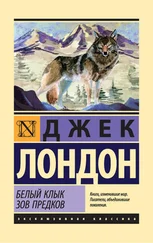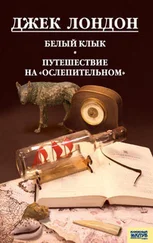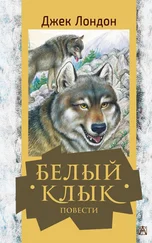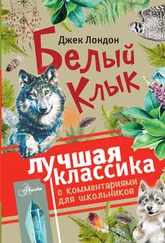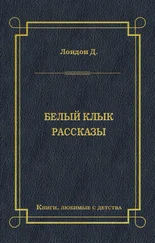“All right.” Weedon Scott said. “If at the end of the afternoon White Fang hasn’t killed a chicken, for every ten minutes of the time he has spent in the yard, you will have to say to him, gravely and with deliberation, just as if you were solemnly passing judgment, [51]‘White Fang, you are smarter than I thought.’”
But, locked in the yard and there deserted by the master, White Fang lay down and went to sleep. Once he got up and walked over to drink. The chickens he calmly ignored. So far as he was concerned they did not exist. At four o’clock he returned to the house. And on the porch, before the delighted family, Judge Scott said to him, slowly and solemnly, sixteen times, “White Fang, you are smarter than I thought.”
White Fang had to learn yet a lot. He had to learn that he must not touch the chickens that belonged to other gods. Then there were cats, and rabbits, and turkeys; all these he must let alone. In fact, when he had but partly learned the law, his impression was that he must leave all live things alone. A quail could fly up under his nose unharmed. All tense and trembling, he mastered his instinct and stood still. He was obeying the will of the gods.
And then, one day, he saw Dick start a jackrabbit and run it. The master himself encouraged White Fang to join in the chase. And thus he learned that there was no taboo on jackrabbits. In the end he worked out the complete law. Between him and all domestic animals there must be no hostility. But the other animals – the squirrels, and quail, and cottontails, were creatures of the Wild. They were the lawful prey of any dog.
Life was complex in the Santa Clara Valley after the Northland. Life had a thousand faces, and White Fang found he must meet them all. In the town of San Jose, life flowed past him, deep and wide and varied, and he had almost always to suppress his natural impulses.
There were butcher-shops, there were cats, and there were dogs everywhere that snarled at him and that he must not attack. And then, on the crowded pavements there were a lot of people whose attention he attracted. They stopped and looked at him, pointed at him, talked of him, and, worst of all, patted him. And all this he had to endure. And he did. Furthermore, he got over his awkwardness and behaved normally. But there was something about him that prevented familiarity. They patted him and passed on, pleased with their own daring.
But it was not all easy for White Fang. Running behind the carriage in the outskirts of San Jose, he saw small boys who threw stones at him. Yet he knew that it was not permitted him to pursue and drag them down. Here he had to violate his instinct of self-preservation.
Nevertheless, White Fang was not quite satisfied. He had no ideas about justice and fair play. He forgot that the gods, too, were to care for him and defend him. But one day the master sprang from the carriage, whip in hand, and gave the stone-throwers a thrashing. After that they threw stones no more, and White Fang understood and was satisfied.
On the way to town, near the saloon at the cross-roads, were three dogs that made a practice of rushing out upon him when he went by. The master always reminded White Fang of the law that he must not fight. He obeyed the law. His snarl kept the three dogs at a distance. The men at the saloon always told the dogs on to attack White Fang. One day they openly sicked the dogs [52]on him. The master stopped the carriage.
“Go to it,” he said to White Fang.
But White Fang could not believe. He looked at the master, and he looked at the dogs, then he looked back at the master.
The master nodded his head. “Go to them, old fellow. Eat them up.”
White Fang no longer hesitated. He turned and leaped silently among his enemies. All three faced him. There was a great snarling and growling, and clashing of teeth. The dust of the road arose in a cloud and screened the battle. But in several minutes two dogs were dead and the third was in running away. White Fang followed, sliding over the ground in wolf manner and with wolf speed, and in the centre of the field he dragged down and slew the dog.
With this triple killing his main troubles with dogs ceased.
Chapter IV. The Call of Kind
The months came and went. There was plenty of food and no work in the Southland, and White Fang lived fat and prosperous and happy. He was not only in the geographical Southland, bu in the Southland of life. Human kindness was like a sun shining upon him, and he flourished like a flower in good soil.
And yet he was different from other dogs, as though the Wild still was in him and the wolf in him merely slept.
He never played with other dogs. He could not like them, they had always been his enemies. Besides, all Southland dogs looked upon him with suspicion, because he aroused in them their instinctive fear of the Wild. But he tolerated them.
But there was one problem in White Fang’s life – Collie. She never gave him a moment’s peace. She had never forgiven him the chicken-killing episode, and believed that his intentions were bad. She became a policeman following him everywhere. His favourite way of ignoring her was to lie down, with his head on his fore-paws, and pretend sleep. This always silenced her.
With the exception of Collie, all things went well with White Fang. He had learned control, and he knew the law. He achieved calmness and philosophic tolerance. He no longer lived in a hostile environment. Danger and hurt and death did not lurk everywhere around him.
He missed the snow without knowing it. Sometimes, when he suffered from the sun, he experienced faint longings for the Northland. But it didn’t produce much effect upon him.
White Fang had never been very demonstrative. Beyond his snuggling and the crooning note into his love-growl, he had no way of expressing his love. Yet he discovered a third way. He had always been susceptible to the laughter of the gods. Laughter made him frantic with rage. But he could not be angry with the love-master, and when that god laughed at him good-naturedly, he was tolerant. He could feel the stinging of the old anger as it rose up in him, but it fought against love. He could not be angry; yet he had to do something. At first he was dignified, and the master laughed more. Then he tried to be more dignified, and the master laughed more than before. In the end, the master laughed him out of his dignity. His jaws slightly parted, his lips lifted a little, and a quizzical expression – more love than humour – came into his eyes. He had learned to laugh.
Likewise he learned to romp with the master, to be rolled over, and be the victim of innumerable rough tricks. In return he pretended to be angry, bristling, growling, clipping his teeth together. But he never forgot himself. Those snaps were always on the empty air. At the end of such a romp, they broke off suddenly and stood several feet apart, looking at each other. And then, just as suddenly they began to laugh. Then the master embraced him, while White Fang crooned his love-song.
But nobody else ever romped with White Fang. He did not permit it. He stood on his dignity, and when they attempted it, his warning snarl and bristling mane were not playful. The fact that he allowed the master these liberties was no reason that he should be a common dog, loving here and loving there. He loved only one person, wholeheartedly, and refused to cheapen himself or his love.
The master went out on horseback [53]a lot, and to accompany him was one of White Fang’s main duties. There were no sleds in the Southland, and he could not be a sled-dog, so he showed his loyalty in the new way, by running with the master’s horse.
Once the master was trying to teach his horse the method of opening and closing gates without the rider’s dismounting. Many times he ranged the horse up to the gate in the effort to close it and each time the horse became frightened and backed away. It grew more nervous and excited every moment. White Fang watched anxiously until he could contain himself no longer, so he sprang in front of the horse and barked savagely and warningly.
Читать дальше
Конец ознакомительного отрывка
Купить книгу
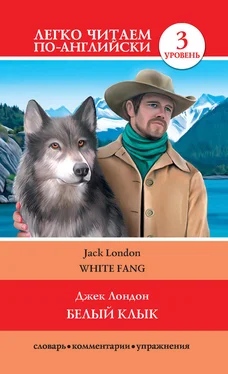
![Джек Лондон - Белый Клык [сборник]](/books/30184/dzhek-london-belyj-klyk-sbornik-thumb.webp)

